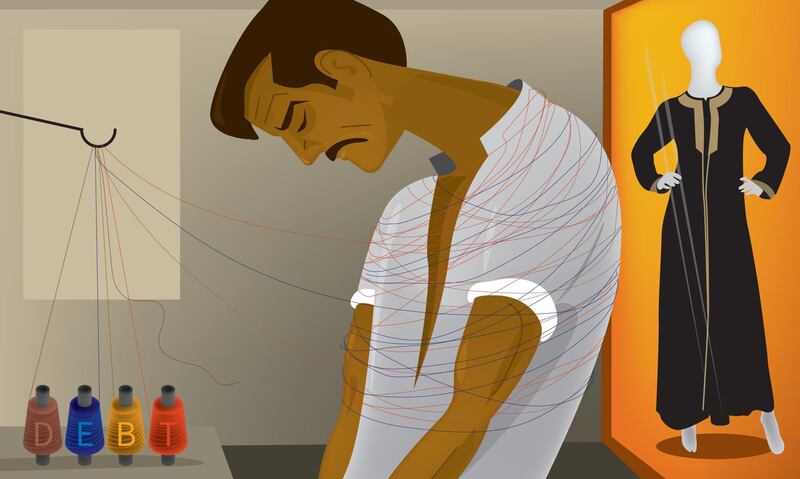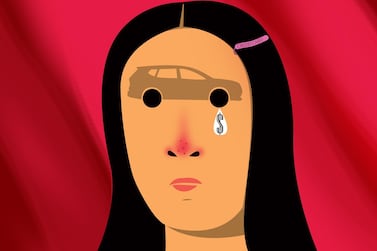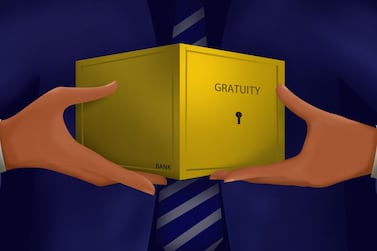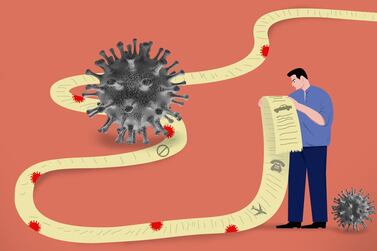I moved to the UAE as a teenager 20 years ago from Pakistan to help my father run his abaya business in Ras al Khaimah. He died soon after I arrived and I continued to run the business. One of my big purchases was an embroidery machine, which I bought from outside the country in 2014.
However, since 2017 my fortunes have changed due to a series of legal challenges. In 2017, I wrote a cheque of Dh127,000 because I had to buy fabrics for the shop and the Abu Dhabi supplier would not wait. However, the cheque bounced because I was having a rent issue with my landlord so I had insufficient funds in my account. The supplier then reported me to the police and I was sent to jail in Abu Dhabi for a month in July last year.
Because I did not have the money to repay the debt, the court auctioned off my machines. The landlord then said I had to vacate the shop because I could not pay the rent. I asked him to give me time to find somewhere to relocate the business to but he complained to the police station about me. I was scared because I thought they would send me to Pakistan.
I now have to pay about Dh160,000 to clear my liabilities, which includes the bounced cheque, court fees and the company’s rent. There are two cases against me: one in Abu Dhabi over the bounced cheque and a second in Ras al Khaimah over the company’s rent. My visa has been cancelled and I am forbidden to travel so I cannot leave the country.
I have been receiving help from a charity but it has been closed for two months now. I have now not worked since 2017 and I cannot earn any money. The court is still demanding this money and I do not have it so I need some kind of help to resolve this.
I still live in my house in Ras al Khaimah and I owe landlord Dh2,000 in rent, which I cannot afford to repay. The landlord calls me every day asking for money but I tell him to wait. I cannot work until I pay off my debts.
I have not been to Pakistan since 2015. I have three school age children there that I cannot support and my wife is here with me. How can I restore my life? MN, Ras al Khaimah
Debt panellist 1: Rima Mrad, partner at law firm BSA Ahmad Bin Hezeem & Associates
It is indeed a challenging situation. From a legal perspective, you have limited recourses to address the cases and legal challenges you are facing without having a secure source of income. At this stage, you just need to get yourself into a position where you can comply with the law.
It is very important that you maintain control of your business, but if this is not possible then you should find alternative employment that will provide a source of income. Even a small salary could then be used as a basis to negotiate settlements with the parties that have cases against you.
To sort out this issue efficiently, you should:
• Reach out to the courts that issued the judgments for the payments against you
You can apply to the courts to pay these amounts in instalments. Paying in instalments is a possibility provided you can commit to a schedule. The court won't recognise that you cannot make a payment at all but it will allow you to present an offer of payment in instalments to the other party. This will avoid an escalation of actions that could be taken against you if you stay in default.
• Find employment or revive your business
You need to find a way to resume your business operations or find an alternative work arrangement that can generate income for you. Without this, you will not be able to move ahead and sort out your current claims unless someone steps in and pays your dues on your behalf.
• Discuss amicable settlements with your creditors
You need to negotiate amicable settlements with your creditors provided that you only commit to what you can deliver otherwise you may eventually find yourself in a situation that is much worse that today.
In the meantime, try reaching out to the Pakistani embassy to see if they have any current pro bono / charitable programme that could support you.
Debt panellist 2: Ambareen Musa, founder and chief executive of Souqalmal.com
The only two ways you can gather the funds to settle and close both your court cases are either to earn an income or liquidate your savings. It is clear that your business's primary asset – the embroidery machine – has been sold off to recover some of your debt. And it is also safe to assume that you don't have assets or investments back home that can be liquidated to pay off your debts and legal expenses in the UAE.
So your next move should be to find a legal way to earn some money, while you're stuck in the country. Approach the embassy of Pakistan in the UAE to see if they can get you access to pro-bono legal advice regarding where and how you can seek employment in the UAE. This could possibly be a part-time or temporary work arrangement in a free zone. Another option to explore is to consider employment options for your wife. Since the court cases aren't filed against her, would she be in a position to find a job based on her skills and qualifications?
Ultimately, the only way out of this situation is to repay your creditors. A quick win would be to unlock a small regular income, through one of the options mentioned above, so you can repay your landlord and settle the court case. This would also give you some breathing space where you don't have to worry about your ongoing rent commitment every month. You can then focus on the bigger debt and work towards paying that off.
Debt panellist 3: Stuart Ritchie, chartered financial planner at AES International
Bounced cheques are not decriminalised however debtors with a court-approved payment plan can present this to a criminal court to have the case “frozen”.
The UAE’s new insolvency laws propose that the debtor should offer two ways to solve their financial struggles: either they settle their debts financially by devising a repayment plan through a court-appointed expert, this will allow the debtor to repay their dues while still working. Or they can liquidate their assets to repay their creditors.
If you are unable to restart your business, a suggestion would be to seek immediate employment in order to generate an income. Without assets or income, you will not be able to pay your debts.
Failing that, if you are unable to find employment, there are other charities that can assist you, such as the government financial aid scheme. It's about gaining back confidence, clarity and control.
More information on this and other charitable organisations can be found on the government's information portal on https://bit.ly/36u1GcY.
The Debt Panel is a weekly column to help readers tackle their debts more effectively. If you have a question for the panel, write to pf@thenational.ae










